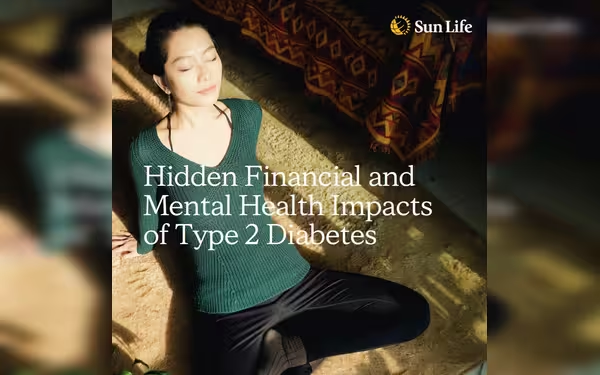Saturday, November 16, 2024 05:42 PM
Sun Life Survey Uncovers Financial and Mental Health Effects of Type 2 Diabetes
- 33% of diabetics face severe financial impacts.
- 65% report negative mental health effects post-diagnosis.
- Only 42% attend annual diabetes screenings.
 Image Credits: prnewswire_apac
Image Credits: prnewswire_apacSun Life's survey reveals alarming financial and mental health impacts of Type 2 diabetes, highlighting urgent need for awareness and preventive measures.
Type 2 diabetes is a growing concern worldwide, affecting over 540 million people, with a significant number residing in Southeast Asia. Recent findings from a survey conducted by Sun Life, titled "Healthy Habits, Healthier Futures: Preventing Diabetes in Asia," shed light on the alarming rise of this condition and its hidden impacts on financial and mental health. The survey, which included responses from 3,647 individuals across various Asian countries, highlights the urgent need for awareness and proactive measures to combat diabetes.
The survey revealed that type 2 diabetes, which accounts for approximately 90% of all diabetes cases globally, is not just a physical ailment but also a source of considerable financial strain. A staggering 33% of individuals living with diabetes reported experiencing a "severe" or "significant" financial impact on their lives. Furthermore, 82% of these individuals struggle to afford consistent healthcare, indicating a critical gap in access to necessary medical services. This financial burden is echoed by non-diabetics, with 67% expressing concern about the potential costs associated with a diabetes diagnosis.
In addition to financial challenges, the mental health implications of diabetes are profound. The survey found that 65% of diabetics reported a negative impact on their mental well-being following their diagnosis. Social stigma also plays a role, as 76% of respondents felt judged by family and friends, while 72% faced bias in the workplace. These findings underscore the multifaceted nature of diabetes, affecting not only physical health but also emotional and social aspects of life.
Despite the rising prevalence of diabetes, awareness and preventive measures remain alarmingly low. Only 42% of survey participants attend annual screenings for type 2 diabetes, and 37% have never been screened at all. This lack of proactive health management can lead to unexpected diagnoses and preventable cases. Moreover, many individuals struggle to maintain healthy lifestyles, with one in five not ensuring their children eat a nutritious diet and 30% not encouraging physical activity.
Sun Life has recognized the importance of addressing these issues and has committed over 55 million CAD since 2012 to combat diabetes through strategic partnerships. Their initiatives include providing access to blood glucose screenings, nutrition advice, and exercise programs, particularly in vulnerable communities. The recent partnership with Beyond Sport to launch the "Hoops + Health" program aims to inspire healthy living through basketball, helping over 14,000 individuals in underprivileged areas to engage in physical activity.
Moreover, the survey highlighted prevalent myths surrounding diabetes, with many individuals misinformed about its risk factors. For instance, 29% believe that type 2 diabetes only affects overweight individuals, while 57% attribute it solely to excessive sugar consumption. Such misconceptions can hinder prevention efforts and early diagnosis, making education on diabetes essential.
The findings from Sun Life's survey reveal a pressing need for increased awareness and education regarding type 2 diabetes. As the number of cases continues to rise, it is crucial for individuals to understand the risks, seek regular screenings, and adopt healthier lifestyles. By addressing the financial and mental health impacts of diabetes, society can work towards a healthier future for all, ensuring that individuals are not only informed but also empowered to take control of their health.













